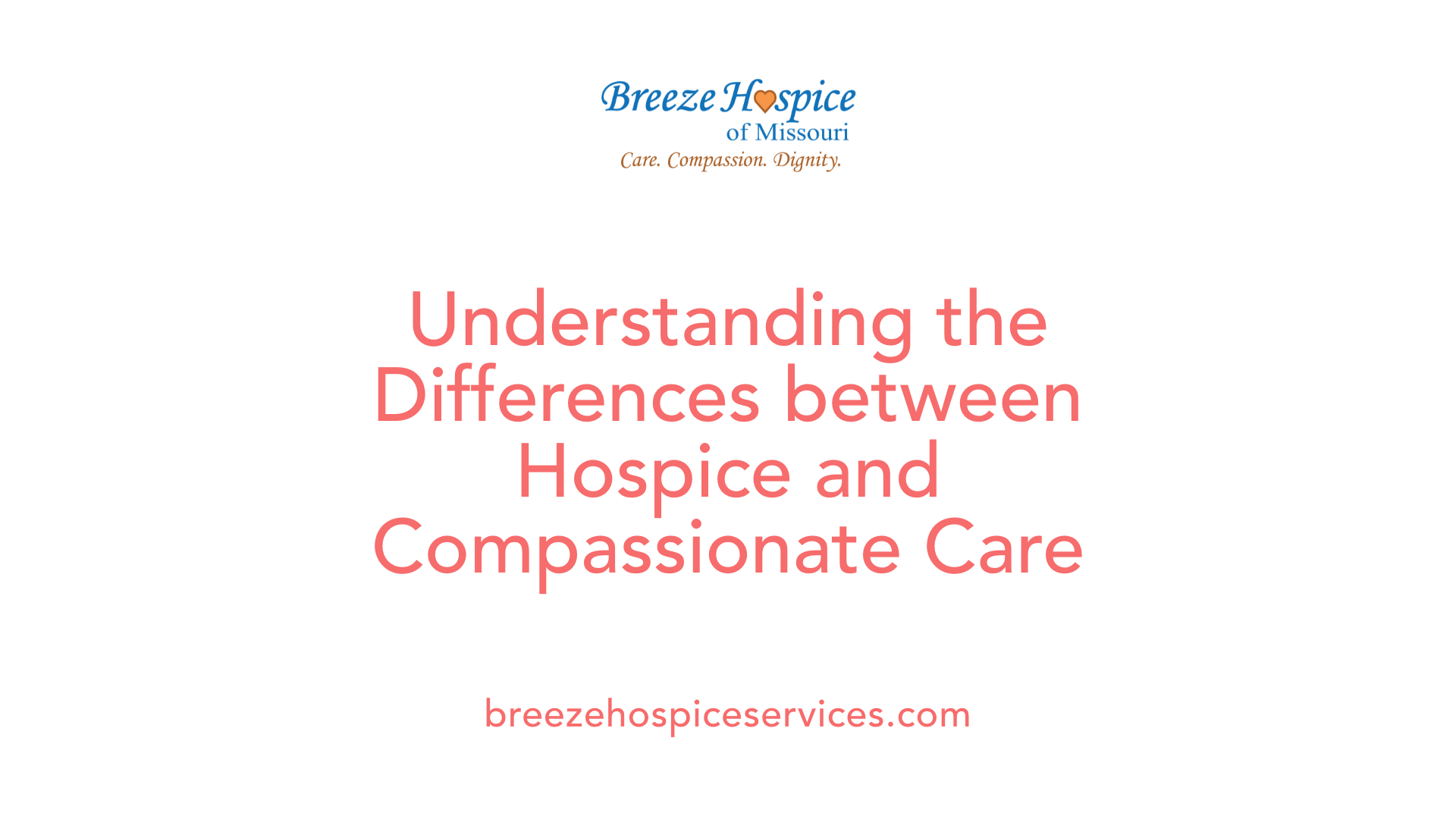The Connection Between Comfort and Compassionate Hospice Care
April 2, 2025
Enhancing Quality of Life in Hospice Settings Through Compassionate Care

Exploring Hospice Care
Hospice care, a form of compassionate healthcare, prioritizes the comfort and dignity of individuals facing terminal illnesses. Rather than focusing on curative treatments, it aims to enhance the quality of life through a holistic approach that addresses physical, emotional, and spiritual needs.
The Principles and Practices of Hospice Care

What are the principles and practices of hospice care that enhance patient comfort and dignity?
Hospice care operates on the foundation of a holistic approach that prioritizes patient comfort and dignity during their final days. It comprehensively addresses the medical, psychological, social, and spiritual needs of individuals facing terminal illnesses. This approach goes beyond treating symptoms; it aims to enhance the overall quality of life.
Holistic Approach
- Comprehensive Care: This includes support not only for physical symptoms but also emotional and spiritual well-being.
- Multidisciplinary Team: A team of healthcare professionals, social workers, and spiritual advisors collaborates to tailor care to individual patients and their families.
Patient Comfort
- Symptom Management: Expert management of pain and discomfort through medications and non-medical therapies ensures patients feel as comfortable as possible. Practical interventions may include relief from shortness of breath, skin irritations, and emotional distress.
- Supportive Environment: Facilities emphasize creating a peaceful and supportive atmosphere, where patients and family members can feel safe and respected.
Symptom Management
- Pain Relief Techniques: Effective strategies are employed to manage pain and alleviate various symptoms such as nausea and terminal agitation. This is rooted in the principles of patient-centered care.
- Emotional and Spiritual Needs: Addressing these needs promotes a sense of peace. Caregivers provide emotional support, allowing patients to navigate their feelings and fears openly.
By focusing on these principles, hospice care significantly uplifts patient experiences at the end of life, allowing them to maintain dignity and comfort while receiving compassionate support.
Differentiating Hospice Care from Compassionate Care

What is the difference between hospice care and compassionate care?
Hospice care and compassionate care are both aimed at enhancing comfort for patients with serious illnesses, yet they present distinct focuses and scopes.
Definition of hospice care: Hospice care is a holistic approach specifically designed for patients who are in the end stages of their life, typically with a prognosis of six months or less. It prioritizes pain relief, symptom management, and emotional and spiritual support, not only for patients but also for their families as they navigate the dying process.
Aspects of compassionate care: In contrast, compassionate care is often viewed as a subset of the broader hospice philosophy. This type of care places significant emphasis on personalized and adaptable care plans aimed at alleviating suffering wherever the patient may reside—be it at home, in a facility, or elsewhere. While hospice care is comprehensive and supportive in navigating the dying process, compassionate care caters more to the individual needs of patients and fosters an environment of emotional comfort and dignity.
| Aspect | Hospice Care | Compassionate Care |
|---|---|---|
| Focus | Holistic support for end-of-life | Individual symptom management |
| Setting | Primarily home or designated hospice facilities | Flexible, can occur in various environments |
| Emphasis | Comprehensive emotional and spiritual support | Personalized, adaptable care |
In summary, while hospice care embodies a comprehensive philosophy, compassionate care hones in on individual support needs.
Trust and Relationships in Hospice Care

What roles do trust and relationships play in enhancing the hospice care experience?
Trust and strong relationships are fundamental to enhancing the hospice care experience. They enable open communication and personalized care, both crucial for effective end-of-life support. When healthcare providers actively listen and show empathy, it builds a necessary foundation of trust. This trust is essential for discussing sensitive topics such as end-of-life preferences and individual care goals.
Cultural competence and language concordance also significantly enhance these relationships. By respecting and integrating patients’ diverse cultural backgrounds, hospice teams can better understand their unique needs. This level of understanding fosters a deeper sense of connection.
Involving patients and their families in care planning empowers them. This involvement not only helps families feel more secure about the care being provided but also instills confidence in the hospice services themselves. Consistent caregivers are critical in this process, as they create a familiar and safe environment for both patients and families.
Moreover, strong relationships with hospice staff contribute to a compassionate atmosphere that addresses emotional, spiritual, and physical needs. This holistic approach ultimately leads to improved patient outcomes and satisfaction, affirming the essential roles of trust and relationships in quality hospice care.
Emotional and Spiritual Support in Hospice

How does hospice care support emotional and spiritual needs during the end-of-life stages?
Hospice care provides vital emotional and spiritual support during the end-of-life stages, addressing the unique and profound needs of patients and their families. This individualized approach fosters a compassionate environment where patients can express their emotions, fears, and concerns freely.
One of the key aspects of emotional support involves creating a safe space for open conversations. Caregivers facilitate discussions that allow patients to share their feelings and experiences, fostering connections that contribute to healing and closure. This sense of emotional safety is crucial in alleviating anxiety and promoting a sense of peace.
At the same time, hospice’s spiritual care is tailored to respect and honor the diverse beliefs and values of each patient. Whether through prayer, meditation, or meaningful conversations about their life’s purpose, spiritual support may offer significant comfort. Importantly, it encourages patients to reflect on their lives, facilitating a sense of meaning in their journey.
Additionally, hospice care extends its support to families, offering bereavement services to help them navigate their grief. Personalized memory projects and ongoing communication help create lasting connections with the patient, celebrating their life and legacy.
Overview of Emotional and Spiritual Care in Hospice
| Aspect | Purpose | Benefits |
|---|---|---|
| Emotional Support | Creates a safe environment for sharing feelings | Alleviates anxiety, fosters connections |
| Spiritual Care | Respects diverse beliefs and offers reflection | Promotes meaning, provides comfort |
| Family Involvement | Facilitates communication and connection | Eases grief, strengthens relationships |
| Bereavement Support | Helps families navigate loss | Provides ongoing comfort and guidance |
Overall, hospice care embodies a holistic approach, ensuring that emotional well-being and spiritual fulfillment are integral parts of the care experience for patients and their loved ones. This compassionate support helps to enhance dignity and quality of life during a profoundly challenging time.
Integration of Palliative Care in Hospice Settings

Why might a doctor recommend palliative care?
Doctors recommend palliative care to significantly enhance the quality of life for patients enduring serious or chronic illnesses at any stage. This supportive care specializes in addressing distressing symptoms like pain, nausea, and anxiety while simultaneously providing vital emotional, psychological, and spiritual support.
Unlike concepts tied exclusively to end-of-life scenarios, palliative care is versatile and can be integrated alongside curative treatments. Research indicates that an early introduction of palliative care not only elevates patient satisfaction but may also yield better health outcomes, including improved life expectancy in certain cases.
Emphasis on non-curative support
Palliative care shifts focus from curative measures to comfort and overall well-being. In hospice settings, the emphasis is placed on pain management, symptom relief, and emotional support—offering a compassionate approach that respects patients’ wishes and individual needs.
The integration of palliative care in hospice significantly benefits patients by ensuring that they receive comprehensive care tailored to enhance their dignity and comfort. Patients are encouraged to express their personal values and preferences, making the hospice experience a more fulfilling journey.
Collaborative approaches in hospice care
Collaboration between healthcare professionals, including doctors, nurses, and spiritual advisors, is central to effective palliative care in hospice settings. This multidisciplinary approach fosters a supportive environment, addressing both physical symptoms and emotional needs.
Incorporating palliative practices strengthens the hospice team’s ability to manage complex symptoms effectively while providing a safety net for families. Enhanced communication between the medical team and hospice caregivers ensures that all aspects of a patient’s well-being—physical, emotional, and spiritual—are thoughtfully integrated into the care plan.
| Aspect | Description | Benefits |
|---|---|---|
| Palliative Care Focus | Comfort and relief from distressing symptoms | Improved quality of life |
| Non-curative Support | Prioritizes symptom management over curative actions | Dignity and peace for patients |
| Multidisciplinary Approach | Involves various healthcare professionals | Comprehensive and personalized care |
By intertwining palliative care with hospice, patients increasingly experience a holistic approach to their end-of-life journey, culminating in a sense of tranquility and support.
The Compassionate Approach of Hospice Care
Hospice care stands as a testament to the deep connection between comfort and compassion. By prioritizing comprehensive, patient-focused care over curative efforts, hospice teams ensure that the final stages of life are spent with dignity, comfort, and respect. As a critical healthcare option, hospice not only ameliorates pain and symptom stress but also meets the emotional and spiritual needs of patients and their families. This approach allows individuals facing terminal illnesses to spend their remaining time in a manner that honors their life and relationships, bringing peace to both the patients and their loved ones.
References
- Compassionate Comfort: Why Hospice and Palliative Care are the ...
- Compassion and Comfort: A Guide to Hospice Care
- Providing Care and Comfort at the End of Life
- How to Create a Compassionate Hospice Care Program
- United in Compassion - Adoration Home Health & Hospice
- Hospice Care 101: Comfort and Quality of Life for Patients and Their ...
- Compassionate Hospice Care
- HOSPICE SPIRITUAL CARE: GUIDED BY COMPASSION AND ...
- Understanding the Meaning of Hospice Care - Compassus


































































































